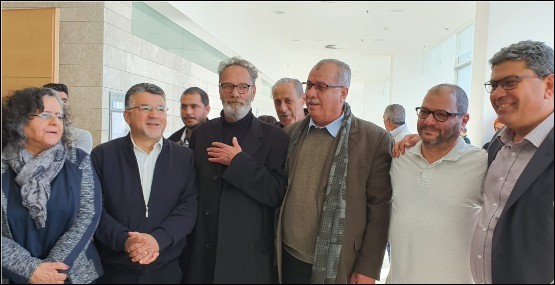Supreme Court Justice Noam Sohlberg disqualified himself on Sunday, August 2, from participating in a hearing on an appeal against the banning of the 2002 documentary Jenin, Jenin. Sohlberg recused himself because in 2004 he wrote an op-ed piece in which he expressed support for criminally prosecuting Muhammed Bakri, the creator of the film, for libel. The jurist’s decision to recuse himself came after a request from Bakri’s lawyers.

Muhammad Bakri (third from left) with Hadash lawmakers Aida Touma-Sliman and Ofer Cassif, former Hadash MKs Muhammad Barakeh and Yousef Jabareen and the Communist Party of Israel Secretary General, Adel Amer, at the Lod District Court, January 11, 2021 (Photo: Zo Haderech)
“There is concern that [Sohlberg’s] negative attitude toward the film and its creator, as he demonstrated in the article, would affect his neutrality and his factual examination,” Bakri’s lawyers said, according to the Ynet website.
After recusing himself from the case, Sohlberg said that he had not actually seen the film when he made those comments in 2004, but was rather using it as an example when responding to the then Attorney General’s “not supporting the indictment of those [allegedly] slandering” Israeli soldiers who took part in the 2002 battle against the Palestinian refugee camp in Jenin during the Second Intifada.
Last January, the Lod District Court ruled that the documentary film could not be screened in Israel and that all copies should be seized. The court also ordered the payment of damages to an army reservist officer whom, it ruled, was defamed in the film. Lt. Col. (res.) Nissim Magnagi filed his suit against filmmaker Mohammad Bakri in November 2016, demanding NIS 2.6 million (approximately $820,000) in damages and an end to the screening of the documentary. Bakri then appealed Lod District Court’s ruling before the Supreme Court in a hearing in which Sohlberg was scheduled to take part. Magnagi’s lawsuit was the second defamation suit to be brought against Bakri for his film.
During the 11-day April 2002 battle in the Palestinian refugee camp in Jenin in the occupied West Bank, 52 Palestinians were killed by Israeli forces. According to Human Rights Watch, only 27 of Palestinian fatalities were combatants. Twenty-three Israeli soldiers were killed in the fighting. Rumors of a massacre had spread following a decision by the military to effectively cut off all outside ties to Jenin during the fighting, prompting Bakri to enter the city with a film crew to interview residents.
Bakri had participated in a Hadash demonstration at a checkpoint during Israel’s invasion of Jenin and was shocked when soldiers shot at the crowd, wounding a fellow actor standing next to him. He tells audiences that this experience inspired him to sneak into Jenin with a camera and ask residents, “What happened?” The result was the documentary Jenin, Jenin which includes a range of testimonies which suggest that a massacre had indeed taken place. Bakri intention in filming was to give voice to Palestinians who could not otherwise reach the media due to the sealing off of the city; consistent with this aim, he chose not to interview Israeli officials for the film.
Related:
- Hadash: “Jenin, Jenin” Law is Dangerous and Anti-Democratic
- Muhammad Bakri: “Since ‘Jenin, Jenin’ Came out 18 Years Ago, We Have Been under Constant Attack”
- Court Bans Screening, Distribution of the Film “Jenin, Jenin” in Israel


